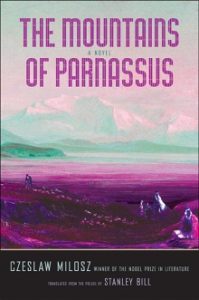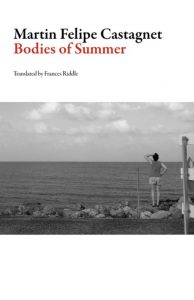 The Mountains of Parnassus by Czeslaw Milosz, translated by Stanley Bill (Yale University Press, January 10)
The Mountains of Parnassus by Czeslaw Milosz, translated by Stanley Bill (Yale University Press, January 10)
“Written in the 1970s and published posthumously in Polish in 2012, Milosz’s deliberately unfinished novel is set in a dystopian future where hierarchy, patriarchy, and religion no longer exist. Echoing the structure of The Captive Mind and written in an experimental, postmodern style, Milosz’s sole work of science fiction follows four individuals: Karel, a disaffected young rebel; Lino, an astronaut who abandons his life of privilege; Petro, a cardinal racked with doubt; and Ephraim, a potential prophet in exile.”
 Spells by
Spells by
“Hitherto unavailable in English, Spells, by the Belgian dramatist Michel de Ghelderode, ranks among the 20th century’s most noteworthy collections of fantastic tales. Like Ghelderode’s plays, the stories are marked by a powerful imagination and a keen sense of the grotesque, but in these the author speaks to us still more directly. Written at a time of illness and isolation, and conceived as a fresh start, Spells was Ghelderode’s last major creative work, and he claimed it as his most personal and deeply felt one: a set of written spells through which his fears, paranoia and nostalgia found concrete form. By turns mystical, macabre and whimsically humorous, and set in the unsettled atmosphere of Brussels, Ostend, Bruges and London, Spells conjures up an uncanny realm of angels, demons, masks, effigies and apparitions, a twilit, oppressed world of diseased gardens, dusty wax mannequins and sinister relics.”
 Bodies of Summer by Martin Felipe Castagnet, translated by Frances Riddle (Dalkey Archive Press, January 27)
Bodies of Summer by Martin Felipe Castagnet, translated by Frances Riddle (Dalkey Archive Press, January 27)
“The existence of an afterlife is now a fact: heaven is the internet. Death is only an interruption as souls can be uploaded to the web and new bodies can be purchased by those wishing to reenter the physical world. The need to settle an old score pushes Ramiro Olivaires to move from the comfort of virtual existence back into a human body. Ramiro’s grandson, however, can only afford the body of an overweight middle-aged woman. In the shell of this new body, Ramiro must adjust to the dizzying transformations that the world has undergone since his death. Using Ramiro himself as an avatar, Castagnet walks us through a stifling new version of reality where sex, gender, identity, religion, and politics are defined by the limitless possibilities of the human body.”

 “Milla” by Lorenzo Crescentini and Emanuela Valentini
“Milla” by Lorenzo Crescentini and Emanuela Valentini